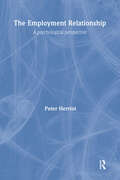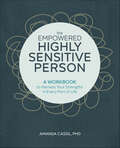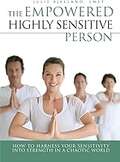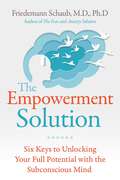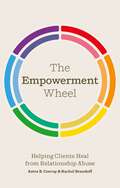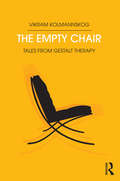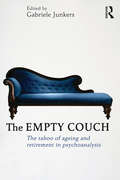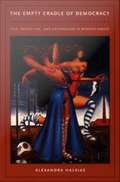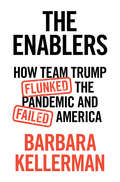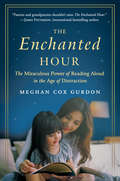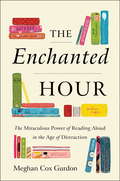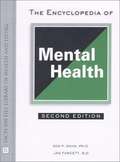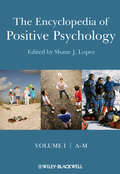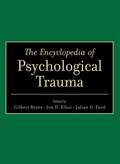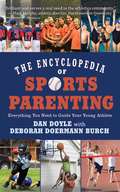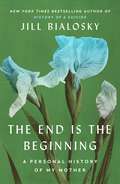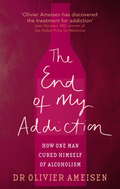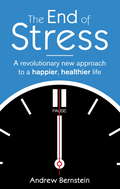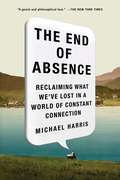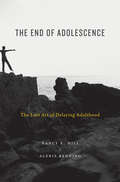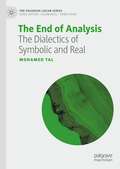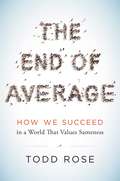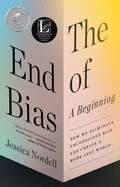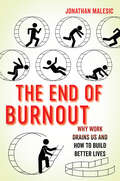- Table View
- List View
The Employment Relationship: A Psychological Perspective
by Peter HerriotThe Employment Relationship presents a controversial perspective on an area hitherto dominated by industrial relation experts and radical sociological theorists. Exploring some of the metaphors commonly used to describe the employment relationship, Peter Herriot argues that it is often their dark rather than their bright side which best expresses how employees really feel. Human resources sometimes feel like human discards! The main culprits in this situation, he suggests, are the top managers who fail to treat employment as a relationship and employees as individuals. He concludes that management rhetoric must be replaced by real dialogue and points to three issues where this is most crucial: employee compliance, contractual inequalities and the need for organisational change. The Employment Relationship will make essential reading for all managers and occupational psychologists. It will also be of interest to students of work psychology, human resource management or organisational behaviour.
The Empowered Highly Sensitive Person: A Workbook to Harness Your Strengths in Every Part of Life
by Amanda CassilBecome a highly empowered, highly sensitive person with practical strategies and exercisesDo you experience more emotional intensity than others? Do you tend to be more easily overstimulated or process information more slowly? You may be an empath or a highly sensitive person (HSP). Functioning in a world not made for your sensibilities can be overwhelming, but The Empowered Highly Sensitive Person is full of practical, research-based exercises to help. With this workbook, you can understand and leverage your qualities as a highly sensitive person for success—no matter what life throws your way.Discover everyday strategies to cope with overstimulation, process intense emotions, curate your experiences and environment, communicate effectively, and practice good self care. Learn to harness your individual HSP characteristics in a way that aligns with your goals. Once you put your high sensitivity into perspective, you can truly get to know yourself.The Empowered Highly Sensitive Person includes:Support for all aspects of life—Exercises are targeted for social situations, relationships, health, or work, so you can find what you need right away.A guide to HSP traits—Get to know your HSP characteristics with in-depth examination and an at-a-glance checklist of the four principles of the HSP trait.Quick reference guides—Find succinct summaries of each chapter so you can easily revisit their themes and be reminded of what you've learned.Blossom and thrive as a highly sensitive person—this book has the tools you'll need.
The Empowered Highly Sensitive Person: How to Harness Your Sensitivity Into Strength in a Chaotic World
by Julie BjellandMany Highly Sensitive People find our chaotic, modern world very challenging. You might often feel misunderstood, have high-stress levels, and are overwhelmed a lot. You Are Not Alone. Fortunately, there is a way to feel better, and in this book, we explore strategies that will empower you to reach your goals, live your best life, and help you access your gifts and strengths. ~Author Julie Bjelland, LMFT, is a renowned HSP Psychotherapist who specializes in high sensitivity. As the founder of Sensitive Empowerment, she is passionately committed to raising awareness about the extraordinary value inherent in sensitivity. Recognizing the vital importance of education and support, Julie is dedicated to equipping HSPs with the necessary tools to reduce their susceptibility to mental and physical health challenges. Her extensive array of resources stands as a heartfelt endeavor to provide this essential support. Learn more at SensitiveConnection.com.
The Empowerment Solution: Six Keys to Unlocking Your Full Potential with the Subconscious Mind
by Friedemann SchaubBreak free from self-sabotaging survival patterns and transform your life• Discover the six keys to empowerment and take ownership of your life• Activate the healing power of your subconscious mind to accelerate change and growth and eliminate the root causes of chronic anxiety, depression, and other limiting mental and emotional challenges• Learn effective brain-rewiring methods and practical tools based on neuro-linguistic programming and clinical hypnotherapyWhen you&’re struggling with anxiety, depression, and low self-esteem, just keeping your emotions in check seems like a full-time job. Yet, what may hold you back in life even more are your survival patterns. Have you ever wondered why you make yourself invisible, procrastinate, or please others to get their approval? Our subconscious employs survival patterns like these to protect us from rejection, failure, and hurt. However, living in subconscious &“survival mode&” has significant downsides: when we live &“just to survive,&” we become disconnected from our true selves and our innate ability to live an empowered life of purpose, fulfillment, and self-reliant confidence. In this step-by-step guide, Friedemann Schaub, M.D., Ph.D., explores how to break free from the six most common survival patterns—the victim, invisibility, the procrastinator, the chameleon, the helper, and the lover—by engaging the part of the mind that created them in the first place: the subconscious. Providing research-backed insights and brain- rewiring methods based on his 20 years&’ experience, Dr. Friedemann details how, through activating the healing power of the subconscious, you can throw off the shackles of these self-sabotaging patterns and &“flip&” them into the six keys to self-empowerment, allowing you to take self-reliant ownership of your life. Revealing how to work with the subconscious mind and become the leader of your life, the author details how to free yourself from living in survival mode, learn to love and accept yourself, and make authenticity and confidence your everyday way of being.
The Empowerment Wheel: Helping Clients Heal from Relationship Abuse
by Rachel Brandoff Astra CzernyIntimate partner violence leaves long-term effects. Survivors often struggle with issues of safety, self-esteem, and trusting their own ability to make healthy decisions and enter future relationships. This revolutionary treatment method uses art therapy to guide individuals through a journey of self-exploration, helping them to re-discover their confidence and grow beyond their experiences. Each sector of the Empowerment Wheel is supported by a creative project designed to help individuals examine their experience of red flags, boundaries, locus of control, relationship authenticity, self-talk, and integrated self. With this method, clients will learn to recognise the echoes of relationship abuse and begin to rebuild their self-esteem and individual sense of empowerment.Grounded in the authors' extensive experience in the field of trauma and recovery, the Empowerment Wheel provides a measured, client-directed way to guide survivors of intimate partner violence through the healing process to build a healthy, empowered future.
The Empty Chair: Tales from Gestalt Therapy
by Vikram KolmannskogThrough eight compelling stories we get to know the Gestalt therapist Vikram Kolmannskog and some of his clients. These include the businessman Carl who is suffering from chronic burnout, the overwhelmed Marianne who believes she may have been the victim of sexual assualt, the trans woman Annette who breaks with dominant gender norms, the prisoner Jonny who is now encircled by his own self-made wall of isolation, and the beautiful Ask, who falls in love and others fall in love with - including the therapist Vikram. Through these tales of psychotherapy we see how both suffering and healing can occur. With increased awareness and through dialogue we can experience more of ourselves, the other and our world. We become more whole - and that is a good definition of health.
The Empty Couch: The taboo of ageing and retirement in psychoanalysis
by Gabriele JunkersThe Empty Couch is an introduction to the challenges and obstacles inherent in ageing as a psychoanalyst. It addresses the previously neglected issue of ill health, as well as the significance of ageing for psychoanalysts, exploring the analyst’s attitude towards getting older, impermanence and sense of time and space. Covering a wide range of topics Gabriele Junkers brings together expert contributors who discuss the problems of getting physically ill and how to conduct psychoanalysis as an ill therapist. Chapters also address the effects that ageing has on professional stamina, the grief inevitably caused by the losses endured in later life and inquires into the role that institutions (the relevant psychoanalytic institutes or societies) can play in this context. Setting out to encourage discussion on this vital topic, The Empty Couch brings this neglected area into sharp focus. It will be of interest to psychoanalysts, psychotherapists, counsellors, gerontologists and trainees in the psychoanalytic and psychotherapy worlds.
The Empty Cradle of Democracy: Sex, Abortion, and Nationalism in Modern Greece
by Alexandra HalkiasDuring the 1990s, Greece had a very high rate of abortion at the same time that its low birth rate was considered a national crisis. The Empty Cradle of Democracy explores this paradox. Alexandra Halkias shows that despite Greek Orthodox beliefs that abortion is murder, many Greek women view it as "natural" and consider birth control methods invasive. The formal public-sphere view is that women destroy the body of the nation by aborting future citizens. Scrutiny of these conflicting cultural beliefs enables Halkias's incisive critique of the cornerstones of modern liberal democracy, including the autonomous "individual" subject and a polity external to the private sphere. The Empty Cradle of Democracy examines the complex relationship between nationalism and gender and re-theorizes late modernity and violence by exploring Greek representations of human agency, the fetus, national identity, eroticism, and the divine. Halkias's analysis combines telling fragments of contemporary Athenian culture, Greek history, media coverage of abortion and the declining birth rate, and fieldwork in Athens at an obstetrics/gynecology clinic and a family-planning center. Halkias conducted in-depth interviews with one hundred and twenty women who had had two or more abortions and observed more than four hundred gynecological exams at a state family-planning center. She reveals how intimate decisions and the public preoccupation with the low birth rate connect to nationalist ideas of race, religion, freedom, resistance, and the fraught encounter between modernity and tradition. The Empty Cradle of Democracy is a startling examination of how assumptions underlying liberal democracy are betrayed while the nation permeates the body and understandings of gender and sexuality complicate the nation-building projects of late modernity.
The Enablers: How Team Trump Flunked the Pandemic and Failed America
by Barbara KellermanThe COVID-19 pandemic will forever be remembered as a pivotal event in American history. Written by one of the world's foremost experts on leadership and followership, this book centers on the first six months of the pandemic and the crises that ran rampant. The chapters focus less on the former president, Donald Trump, than on his followers: on people complicit in his miserable mismanagement of the crisis in public health. Barbara Kellerman provides clear and compelling evidence that Trump was not entirely to blame for everything that went wrong. Many others were responsible including his base, party, administration, inner circle, Republican elites, members of the media, and even medical experts. Far too many surrendered to the president's demands, despite it being obvious his leadership was fatally flawed. The book testifies to the importance of speaking truth to power, and a willingness to take risks properly to serve the public interest.
The Enchanted Hour: The Miraculous Power of Reading Aloud in the Age of Distraction
by Meghan Cox GurdonA Wall Street Journal writer’s conversation-changing look at how reading aloud makes adults and children smarter, happier, healthier, more successful and more closely attached, even as technology pulls in the other direction.A miraculous alchemy occurs when one person reads to another, transforming the simple stuff of a book, a voice, and a bit of time into complex and powerful fuel for the heart, brain, and imagination. Grounded in the latest neuroscience and behavioral research, and drawing widely from literature, The Enchanted Hour explains the dazzling cognitive and social-emotional benefits that await children, whatever their class, nationality or family background. But it’s not just about bedtime stories for little kids: Reading aloud consoles, uplifts and invigorates at every age, deepening the intellectual lives and emotional well-being of teenagers and adults, too.Meghan Cox Gurdon argues that this ancient practice is a fast-working antidote to the fractured attention spans, atomized families and unfulfilling ephemera of the tech era, helping to replenish what our devices are leaching away. For everyone, reading aloud engages the mind in complex narratives; for children, it’s an irreplaceable gift that builds vocabulary, fosters imagination, and kindles a lifelong appreciation of language, stories and pictures.Bringing together the latest scientific research, practical tips, and reading recommendations, The Enchanted Hour will both charm and galvanize, inspiring readers to share this invaluable, life-altering tradition with the people they love most.
The Enchanted Hour: The Miraculous Power of Reading Aloud in the Age of Distraction
by Meghan Cox Gurdon'As soon as I began to read, I was filled with that kind of engrossed blossoming that happens somewhere inside of you when you start a really nourishing book.' - Pandora SykesA conversation-changing look at the social, familial, neurological, and psychological benefits of reading aloud, especially for parents and children. A miraculous alchemy occurs when one person reads to another, transforming the simple stuff of a book, a voice, and a bit of time into complex and powerful fuel for the heart, brain, and imagination. Grounded in the latest neuroscience and behavioural research, and drawing widely from literature, The Enchanted Hour explains the dazzling cognitive and social-emotional benefits that await children who are read to, whatever their class, nationality or family background. Meghan Cox Gurdon argues that this ancient practice is a fast-working antidote to the fractured attention spans, atomized families and unfulfilling ephemera of the tech era, helping to replenish what our devices are leaching away. For everyone, reading aloud engages the mind in complex narratives; for children, it's an irreplaceable gift that builds vocabulary, fosters imagination, and kindles a lifelong appreciation of language, stories and pictures.Bringing together the latest scientific research, practical tips, and reading recommendations, The Enchanted Hour will both charm and galvanize, inspiring readers to share this invaluable, life-altering tradition with the people they love most.
The Encyclopedia of Mental Health (2nd edition)
by Ada P. Kahn Jan FawcettIn this second edition of The Encyclopedia of Mental Health, we have added many articles relating to contemporary challenges to good mental health, including the workplace, family and marital relationships, domestic violence, sexual concerns, lifestyle choices, everyday sources of stress, coping with chronic illness and aging. We have also considered cultural differences in the presentation of symptoms, and we included an extensive article about the cross-cultural influences on mental health.
The Encyclopedia of Positive Psychology
by Shane J. LopezPositive psychology, the pursuit of understanding optimal human functioning, is reshaping the scholarly and public views of how we see the science of psychology. The Encyclopedia of Positive Psychology provides a comprehensive and accessible summary of this growing area of scholarship and practice. 288 specially commissioned entries written by 150 leading international researchers, educators, and practitioners in positive psychology covers topics of interest across all social sciences as well as business and industry the most current, extensive, and accessible treatment of the subject available topical primer clarifies basic constructs and processes associated with positive psychology will be useful to students, teachers, practitioners, businesspeople, and policy makers
The Encyclopedia of Psychological Trauma
by Julian D. Ford Gilbert Reyes Jon D. ElhaiThe Encyclopedia of Psychological Trauma is the only authoritative reference on the scientific evidence, clinical practice guidelines, and social issues addressed within the field of trauma and posttraumatic stress disorder. Edited by the leading experts in the field, you will turn to this definitive reference work again and again for complete coverage of psychological trauma, PTSD, evidence-based and standard treatments, as well as controversial topics including EMDR, virtual reality therapy, and much more.
The Encyclopedia of Sports Parenting: Everything You Need to Guide Your Young Athlete
by Dan Doyle Deborah Doermann BurchFor more than a decade, former basketball coach Dan Doyle has been traveling the country, speaking to student-athletes and their parents about their involvement in and dedication to every sport imaginable. As founder and executive director of the Institute of International Sport at the University of Rhode Island, Doyle has attended his fair share of sporting events and has heard countless stories about confrontations taking place on and off the court between coaches, players, parents, and even fans.As the years passed, Doyle gathered everything he'd learned and heard and joined forces with Deborah Doermann Burch, a former schoolteacher and parenting expert, to write The Encyclopedia of Sports Parenting. Together, they surveyed more than 500 successful sports figures to gain additional insight into what parents can do to guide their children through the competitive, sometimes disheartening--though oftentimes rewarding--world of sports.In this book, parents will learn how to express themselves in various challenging situations, including learning that their children have been cut from teams; have become victims of team violence, hazing, or bullying; or are not receiving adequate and assumedly deserved playing time.
The End Is the Beginning: A Personal History of My Mother
by Jill BialoskyJill Bialosky, the poet behind the &“tender, absorbing, and deeply moving memoir&” (Entertainment Weekly) History of a Suicide, returns with a lyrical portrait of her mother&’s life, told in reverse order from burial to birth.When Iris Yvonne Bialosky died in an assisted care facility on March 29, 2020, it unleashed a torrent of emotions in her daughter, Jill Bialosky. Grief, of course, but also guilt, confusion, and doubt, all of which were compounded by the arrival of the COVID-19 pandemic which made it impossible for Jill to be with her mother as she was dying and to attend her mother&’s funeral. Now, with a poet&’s eye for detail and a novelist&’s flair for storytelling, Jill presents a profoundly moving elegy unlike any other. Starting with her mother&’s end and the physical/cognitive decline that led her to a care home, The End Is the Beginning explores Iris&’s battle with depression, the tragedy of a daughter&’s suicide, a failed second marriage, the death of her beloved first husband only five years into their young marriage, her joyful teenage years, and the trauma of losing her own mother at just eight years old. Compounding her challenges of raising four daughters without a livelihood or partner, Iris&’s life coincided with an age of unstoppable social change and reinvention, when the roles of wife and mother she was raised to inhabit ceased to be the guarantors of stability and happiness. As we see Iris become younger and younger, we learn how we are all the sum of our experiences. Iris becomes a multi-dimensional, fascinating woman. We come to understand her difficulties and shortcomings, her neediness and her generosity, her pride and her despair. The End Is the Beginning is not just a family memoir, it is a brave and compassionate celebration of a woman&’s life and death and a window into a daughter&’s inextricable bond to her mother.
The End Of My Addiction: How one man cured himself of alcoholism
by Olivier AmeisenDr Olivier Ameisen was a brilliant cardiologist and running his own successful practice when he developed a profound addiction to alcohol. Fearing for his life, he immersed himself in AA, rehab and therapy. Nothing worked. So he did the only thing he could; he took his treatment into his own hands. Searching for a cure for his deadly disease, he happened upon baclofen, a muscle relaxant that had been used safely for years as a treatment for various types of muscle spasticity, but had more recently shown promising results in studies with laboratory animals addicted to a wide variety of substances. Dr Ameisen prescribed himself the drug and experimented with increasingly higher doses until he finally reached a level high enough to leave him free of any craving for alcohol. That was more than six years ago. Baclofen, as prescribed under a doctor's care, could possibly help many addicts. But as long as the medical and research establishments ignore a cure for one of the most deadly diseases in the world, we won't be able to understand baclofen's full potential. This book is a plea for research that can rescue millions from the scourge of addiction.
The End Of Stress: A revolutionary new approach to a happier, healthier life
by Andrew J. BernsteinWhere does stress come from? For more than half a century, we've been told it comes from 'adverse external influences', that it's a by-product of our ancestors' fight-or-flight response, and that because life on earth has changed radically, stress is inevitable today. All of this, according to Andrew Bernstein, is wrong.In The End of Stress, he shows you exactly why it's wrong. He takes readers back to the 1930s, pointing out a fundamental error in how the stress concept was initially formulated, and how this mistaken formula has resulted in people relying on inefficient tools such as relaxation and positive thinking. Bernstein then reveals the truth about where stress comes from and introduces a 7-step process that transforms common challenges - including relationships, money, success, weight loss, heartbreak, uncertainty, interpersonal conflict and the loss of a loved one. The End of Stress offers a complete re-education in the nature of negative emotions, training readers in how to transform any issue - at home, at school, at work - in order to live happier, healthier lives.
The End of Absence
by Michael Harris"Every revolution in communication technology--from papyrus to the printing press to Twitter--is as much an opportunity to be drawn away from something as it is to be drawn toward something. And yet, as we embrace a techonology's gifts, we usually fail to consider what we're giving up in the process. Why would we bother to register the end of solitude, of ignorance, of lack? Why would we care that an absence had disappeared?" Soon enough, nobody will remember life before the Internet. What does this unavoidable fact mean? For future generations, it won't mean anything very obvious. They will be so immersed in online life that questions about the Internet's basic purpose or meaning will vanish. But those of us who have lived both with and without the crowded connectivity of online life have a rare opportunity. We can still recognize the difference between Before and After. We catch ourselves idly reaching for our phones at the bus stop. Or we notice how, mid-conversation, a fumbling friend dives into the perfect recall of Google. In this eloquent and thought-provoking book, Michael Harris argues that amid all the changes we're experiencing, the most interesting is the one that future generations will find hardest to grasp. That is the end of absence--the loss of lack. The daydreaming silences in our lives are filled; the burning solitudes are extinguished. There's no true "free time" when you carry a smartphone. Today's rarest commodity is the chance to be alone with your own thoughts. To understand our predicament, and what we should do about it, Harris explores this "loss of lack" in chapters devoted to every corner of our lives, from sex and commerce to memory and attention span. His book is a kind of witness for the "straddle generation"--a burst of empathy for those of us who suspect that our technologies use us as much as we use them. By placing our situation in a rich historical context, Harris helps us remember which parts of that earlier world we don't want to lose forever. He urges us to look up--even briefly--from our screens. To remain awake to what came before. To again take pleasure in absence.
The End of Absence
by Michael HarrisSoon enough, nobody will remember life before the Internet. What does this unavoidable fact mean? Those of us who have lived both with and without the crowded connectivity of online life have a rare opportunity. We can still recognize the difference between Before and After. We catch ourselves idly reaching for our phones at the bus stop. Or we notice how, midconversation, a fumbling friend dives into the perfect recall of Google. In this eloquent and thought-provoking book, Michael Harris argues that amid all the changes we're experiencing, the most interesting is the end of absence-the loss of lack. The daydreaming silences in our lives are filled; the burning solitudes are extinguished. There's no true "free time" when you carry a smartphone. Today's rarest commodity is the chance to be alone with your thoughts. Michael Harris is an award-winning journalist and a contributing editor at Western Living and Vancouvermagazines. He lives in Toronto, Canada.ct recall of Google. In this eloquent and thought-provoking book, Michael Harris argues that amid all the changes we're experiencing, the most interesting is the one that future generations will find hardest to grasp. That is the end of absence--the loss of lack. The daydreaming silences in our lives are filled; the burning solitudes are extinguished. There's no true "free time" when you carry a smartphone. Today's rarest commodity is the chance to be alone with your own thoughts. To understand our predicament, and what we should do about it, Harris explores this "loss of lack" in chapters devoted to every corner of our lives, from sex and commerce to memory and attention span. His book is a kind of witness for the "straddle generation"--a burst of empathy for those of us who suspect that our technologies use us as much as we use them. By placing our situation in a rich historical context, Harris helps us remember which parts of that earlier world we don't want to lose forever. He urges us to look up--even briefly--from our screens. To remain awake to what came before. To again take pleasure in absence.
The End of Adolescence: The Lost Art of Delaying Adulthood
by Nancy E. Hill Alexis ReddingIs Gen Z resistant to growing up? A leading developmental psychologist and an expert in the college student experience debunk this stereotype and explain how we can better support young adults as they make the transition from adolescence to the rest of their lives. Experts and the general public are convinced that young people today are trapped in an extended adolescence—coddled, unaccountable, and more reluctant to take on adult responsibilities than previous generations. Nancy Hill and Alexis Redding argue that what is perceived as stalled development is in fact typical. Those reprimanding today’s youth have forgotten that they once balked at the transition to adulthood themselves. From an abandoned archive of recordings of college students from half a century ago, Hill and Redding discovered that there is nothing new about feeling insecure, questioning identities, and struggling to find purpose. Like many of today’s young adults, those of two generations ago also felt isolated and anxious that the path to success felt fearfully narrow. This earlier cohort, too, worried about whether they could make it on their own. Yet, among today’s young adults, these developmentally appropriate struggles are seen as evidence of immaturity. If society adopts this jaundiced perspective, it will fail in its mission to prepare young adults for citizenship, family life, and work. Instead, Hill and Redding offer an alternative view of delaying adulthood and identify the benefits of taking additional time to construct a meaningful future. When adults set aside judgment, there is a lot they can do to ensure that young adults get the same developmental chances they had.
The End of Analysis: The Dialectics of Symbolic and Real (The Palgrave Lacan Series)
by Mohamed TalThis book interrogates the “end of analysis” in psychoanalytic thought from Freud to Lacan. It demonstrates that the notions of mourning, renunciation, liquidation of transference, and traversal of fantasy cannot serve as a settlement for the castration complex (i.e., central to neurosis) but are rather prey to the castration complex itself. It shows how psychoanalysis remains incomplete as long as it has not surpassed them as fantasies sustained by psychoanalytic ideology. In other words, it argues that the analytic procedure must pull psychoanalysis out of this therapeutic tradition for it to be complete and to instigate an attempt of its renewal.The book equally revisits Freud’s and Lacan’s underpinnings in the Enlightenment project, in order to formulate the problem of transference on proper dialectical foundations—that is, the mechanism of alienation from Descartes to Hegel, Kierkegaard’s concept of anxiety, as well as the concepts of authority and value in Durkheim, Mauss, and Marx. In doing so, it provides fresh insights that will appeal to practitioners, as well as to scholars of psychoanalysis and philosophy.
The End of Average: How We Succeed in a World That Values Sameness
by Todd RoseAre you above average? Is your child an A (or a C) student? Is your employee an introvert or an extrovert? Every day we are measured against the yardstick of averages, judged according to how closely we resemble it or how far we deviate from it. The assumption that metrics comparing us to an average--like development milestones, GPAs, personality assessments, standardized test results, and performance review ratings--reveal something meaningful about our potential is so ingrained in our consciousness that we rarely question it. That assumption, says Harvard's Todd Rose, is spectacularly--and scientifically--wrong.In The End of Average, Rose shows that no one is average. Not you. Not your kids. Not your employees or students. This isn't hollow slogan-eering--it's a mathematical fact with enormous practical consequences. But while we know people learn and develop in distinctive ways, these unique patterns of behaviors are lost in our schools and businesses which have been designed around the mythical "average person." For more than a century, this average-size-fits-all model has ignored our individuality and failed at recognizing talent. It's time to change that.Weaving science, history, and his experiences as a high school dropout, Rose brings to life the untold story of how we came to embrace the scientifically flawed idea that averages can be used to understand individuals and offers a powerful alternative: the three principles of individuality. The jaggedness principle (talent is never one- dimensional), the context principle (traits are a myth), and the pathways principle (we all walk the road less traveled) help us understand our true uniqueness--and that of others--and how to take full advantage of individuality to gain an edge in life.This powerful book will forever change how you see averages and talent.Praise for The End of Average " Todd Rose shows that everything we think we know about 'average' performance is wrong. In fact, our one-dimensional understanding of achievement--our search for the average score, average grade, average talent--has seriously underestimated human potential. This book is readable, enlightening, and way above average."--DANIEL H. PINK, author of To Sell Is Human and Drive " Fascinating, engaging, and practical. Todd Rose dispels the myth that our success can be divined by a simple number or average, whether a grade, a score in a standardized test, or a ranking at work. The End of Average will help everyone--and I mean everyone--live up to their potential."--AMY CUDDY, professor at Harvard Business School and author of Presence" Todd Rose has achieved a rare feat: he is both provocative and right. He overturns our fundamental assumptions about talent, and offers an empowering way to re-think the world. With exciting stories, fresh data, and bold ideas, this book is far better than average."--ADAM GRANT, Wharton professor and New York Times bestselling author of Give and Take and Originals " Consistently mind-blowing!"--Dan Heath, coauthor of the New York Times bestsellers Made to Stick, Switch, Decisive" Todd Rose's thought-provoking book challenges the explanatory power of the everyday term 'average,' opening our minds to new ways of conceptualizing human variation and human potentials."--HOWARD GARDNER, author of Truth, Beauty, and Goodness Reframed " In the midst of a war for talent, we miss huge opportunities to find it. This stunning book shows how almost all the measures we use reduce complicated individuals to one-dimensional beings. As a result, we overlook how talent, context, and disposition fold together to create individual uniqueness. I couldn't put this book down."--JOHN SEELY BROWN, independent cochair of Deloitte's Center for the Edge and coauthor of The Social Life of Information, The Power of Pull, and The New Culture of Learning
The End of Bias: The Science and Practice of Overcoming Unconscious Bias
by Jessica NordellThe End of Bias is a transformative, groundbreaking exploration into how we can eradicate unintentional bias and discrimination, the great challenge of our age.Unconscious bias: persistent, unintentional prejudiced behavior that clashes with our consciously held beliefs. We know that it exists, to corrosive and even lethal effect. We see it in medicine, the workplace, education, policing, and beyond. But when it comes to uprooting our prejudices, we still have far to go.With nuance, compassion, and ten years' immersion in the topic, Jessica Nordell weaves gripping stories with scientific research to reveal how minds, hearts, and behaviors change. She scrutinizes diversity training, deployed across the land as a corrective but with inconsistent results. She explores what works and why: the diagnostic checklist used by doctors at Johns Hopkins Hospital that eliminated disparate treatment of men and women; the preschool in Sweden where teachers found ingenious ways to uproot gender stereotyping; the police unit in Oregon where the practice of mindfulness and specialized training has coincided with a startling drop in the use of force.Captivating, direct, and transformative, The End of Bias: A Beginning brings good news. Biased behavior can change; the approaches outlined here show how we can begin to remake ourselves and our world. Includes illustrated charts
The End of Burnout: Why Work Drains Us and How to Build Better Lives
by Jonathan MalesicGoing beyond the how and why of burnout, a former tenured professor combines academic methods and first-person experience to propose new ways for resisting our cultural obsession with work and transforming our vision of human flourishing. Burnout has become our go-to term for talking about the pressure and dissatisfaction we experience at work. But because we don’t really understand what burnout means, the discourse does little to help workers who are suffering from exhaustion and despair. Jonathan Malesic was one of those workers, and to escape he quit his job as a tenured professor. In The End of Burnout, he dives into the history and psychology of burnout, traces the origin of the high ideals we bring to our dismal jobs, and profiles the individuals and communities who are already resisting our cultural commitment to constant work. In The End of Burnout, Malesic traces his own history as someone who burned out of a tenured job to frame this rigorous investigation of how and why so many of us feel worn out, alienated, and useless in our work. Through research on the science, culture, and philosophy of burnout, Malesic explores the gap between our vocation and our jobs, and between the ideals we have for work and the reality of what we have to do. He eschews the usual prevailing wisdom in confronting burnout ("Learn to say no!" "Practice mindfulness!") to examine how our jobs have been constructed as a symbol of our value and our total identity. Beyond looking at what drives burnout—unfairness, a lack of autonomy, a breakdown of community, mismatches of values—this book spotlights groups that are addressing these failures of ethics. We can look to communities of monks, employees of a Dallas nonprofit, intense hobbyists, and artists with disabilities to see the possibilities for resisting a "total work" environment and the paths to recognizing the dignity of workers and nonworkers alike. In this critical yet deeply humane book, Malesic offers the vocabulary we need to recognize burnout, overcome burnout culture, and find moral significance in our lives beyond work.
